Editor:
Brandon Sweet
University Communications
bulletin@uwaterloo.ca
DNA analysis identifies member of ill-fated Franklin Expedition
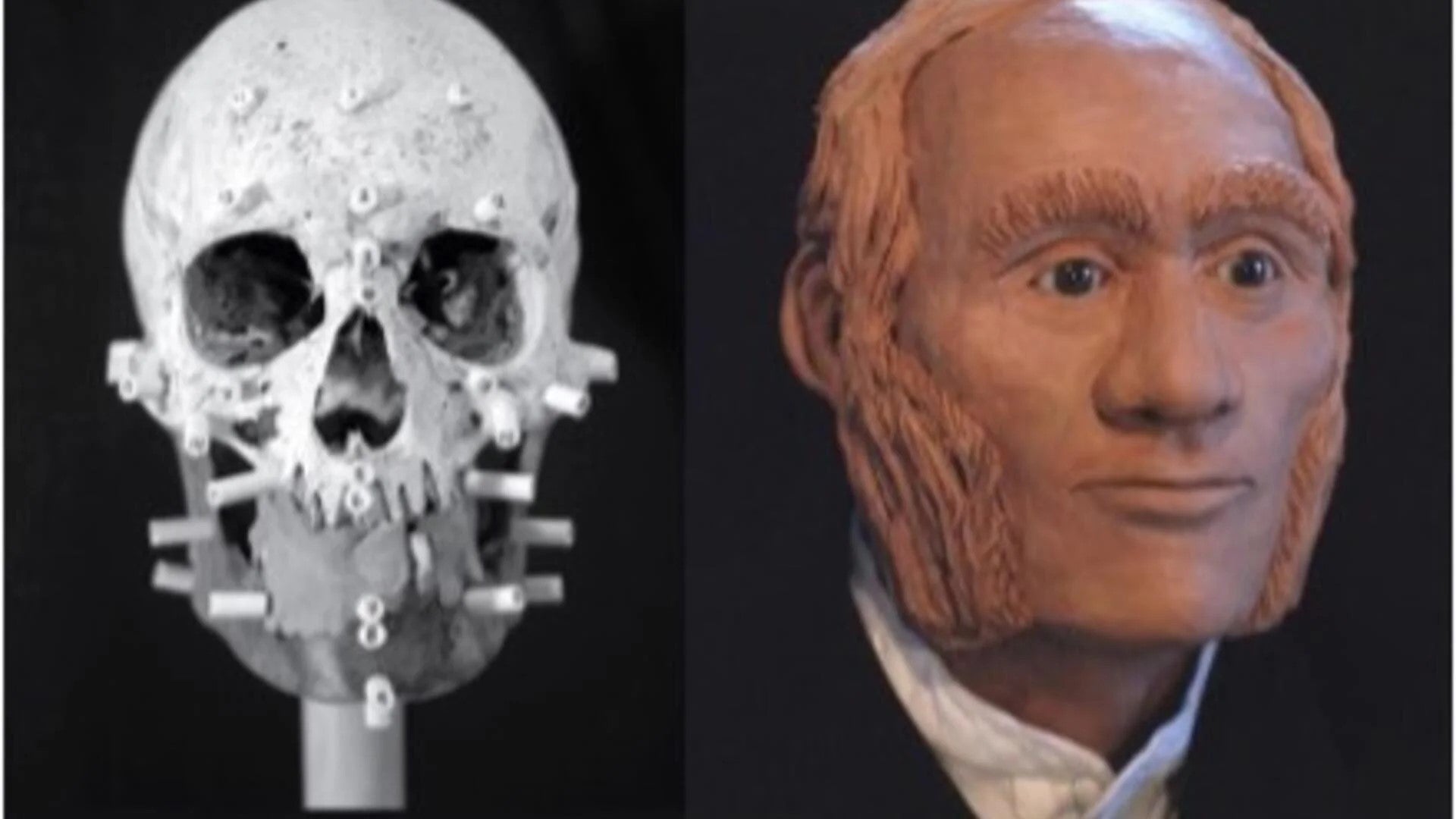
Facial reconstruction of individual identified through DNA analysis as John Gregory, HMS Erebus. (Photos: Diana Trepkov).
This article was originally published on Waterloo News.
The identity of the skeletal remains of a member of the 1845 Franklin expedition has been confirmed using DNA and genealogical analyses by a team of researchers from the University of Waterloo, Lakehead University, and Trent University. This is the first member of the ill-fated expedition to be positively identified through DNA.
DNA extracted from tooth and bone samples recovered in 2013 were confirmed to be the remains of Warrant Officer John Gregory, engineer aboard HMS Erebus. The results matched a DNA sample obtained from a direct descendant of Gregory.
The remains of the officer were found on King William Island, Nunavut. “We now know that John Gregory was one of three expedition personnel who died at this particular site, located at Erebus Bay on the southwest shore of King William Island,” says Douglas Stenton, adjunct professor of anthropology at Waterloo and co-author of a new paper about the discovery.
“Having John Gregory's remains being the first to be identified via genetic analysis is an incredible day for our family, as well as all those interested in the ill-fated Franklin expedition,” said Gregory’s great-great-great grandson Jonathan Gregory of Port Elizabeth, South Africa. “The whole Gregory family is extremely grateful to the entire research team for their dedication and hard work, which is so critical in unlocking pieces of history that have been frozen in time for so long.”
Sir John Franklin’s 1845 northwest passage expedition, with 129 sailors on two ships, Erebus and Terror, entered the Arctic in 1845. In April 1848, 105 survivors abandoned their ice-trapped ships in a desperate escape attempt. None would survive. Since the mid-19th century, skeletal remains of dozens of crew members have been found on King William Island, but none had been positively identified.
To date, the DNA of 26 other members of the Franklin expedition have been extracted from remains found in nine archaeological sites situated along the line of the 1848 retreat. “Analysis of these remains has also yielded other important information on these individuals, including their estimated age at death, stature, and health,” says Anne Keenleyside, Trent anthropology professor and co-author of the paper.
“We are extremely grateful to the Gregory family for sharing their family history with us and for providing DNA samples in support of our research. We’d like to encourage other descendants of members of the Franklin expedition to contact our team to see if their DNA can be used to identify the other 26 individuals,” says Stenton.
Genealogical records indicated a direct, five-generation paternal relationship between the living descendant and John Gregory. "It was fortunate that the samples collected contained well-preserved genetic material, says Stephen Fratpietro of Lakehead’s Paleo-DNA lab, who is a co-author.
Prior to this DNA match, the last information about his voyage known to Gregory’s family was in a letter he wrote to his wife Hannah from Greenland on 9 July 1845 before the ships entered the Canadian Arctic.
This latest discovery helps to complete the story of the Franklin victims, says Robert Park, Waterloo anthropology professor and co-author. “The identification proves that Gregory survived three years locked in the ice on board HMS Erebus. But he perished 75 kilometers south at Erebus Bay.”
The remains of Gregory and two others were first discovered in 1859 and buried in 1879. The grave was rediscovered in 1993, and in 1997 several bones that had been exposed through disturbance of the grave were placed in a cairn with a commemorative plaque. The grave was then excavated in 2013 and after being analyzed, all the remains were returned to the site in 2014 and placed in a new larger memorial cairn.
DNA identification of a sailor from the 1845 Franklin Northwest Passage Expedition by Stenton, Park, Fratpietro, and Keenleyside was published in the journal Polar Record. The research was funded by the Government of Nunavut, Trent University and the University of Waterloo. Descendants of members of the Franklin expedition can contact Douglas Stenton or Anne Keenleyside.
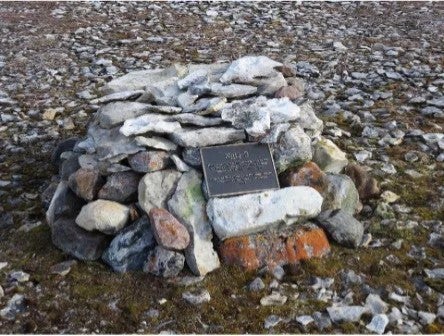
Commemorative cairn at Erebus Bay constructed in 2014. The cairn contains the remains of John Gregory and two other members of the 1845 Franklin expedition (Photos: Diana Trepkov).
Free training from Microsoft and the University to update your skills

Microsoft and the University have partnered to offer free online training in Microsoft Word, PowerPoint and Excel for students, staff and faculty.
This free training is an excellent opportunity to receive industry-recognized certification while advancing your skills. You’ll learn some of the most frequently listed competencies spanning all professions and industries.
As a participant, you’ll have the option to select which skills you’d like to advance through individual, self-guided courses. Each course will take approximately 40 hours to complete.
Participants can expect the following outcomes from each course:
- Microsoft Word: create and maintain professional-looking reports, multi-column newsletters, résumés, and business correspondence.
- Microsoft Excel: create and edit a workbook with multiple sheets and use a graphic element to represent data visually. Workbook examples include professional-looking budgets, financial statements, team performance charts, sales invoices, and data-entry logs.
- Microsoft PowerPoint: create and manage presentations, insert and format shapes and slides, create slide content, apply transitions and animations and manage multiple presentations. Presentation examples include professional-grade sales presentations, employee training, instructional materials and kiosk slideshows.
Those interested can self-register for the Microsoft Certification Preparation course in LEARN until May 21. Online certification exams will take place in July and August.
Find further information on the course landing page. Direct your questions about the courses or how to enroll to WILskills@uwaterloo.ca.
Making her mark in 3D
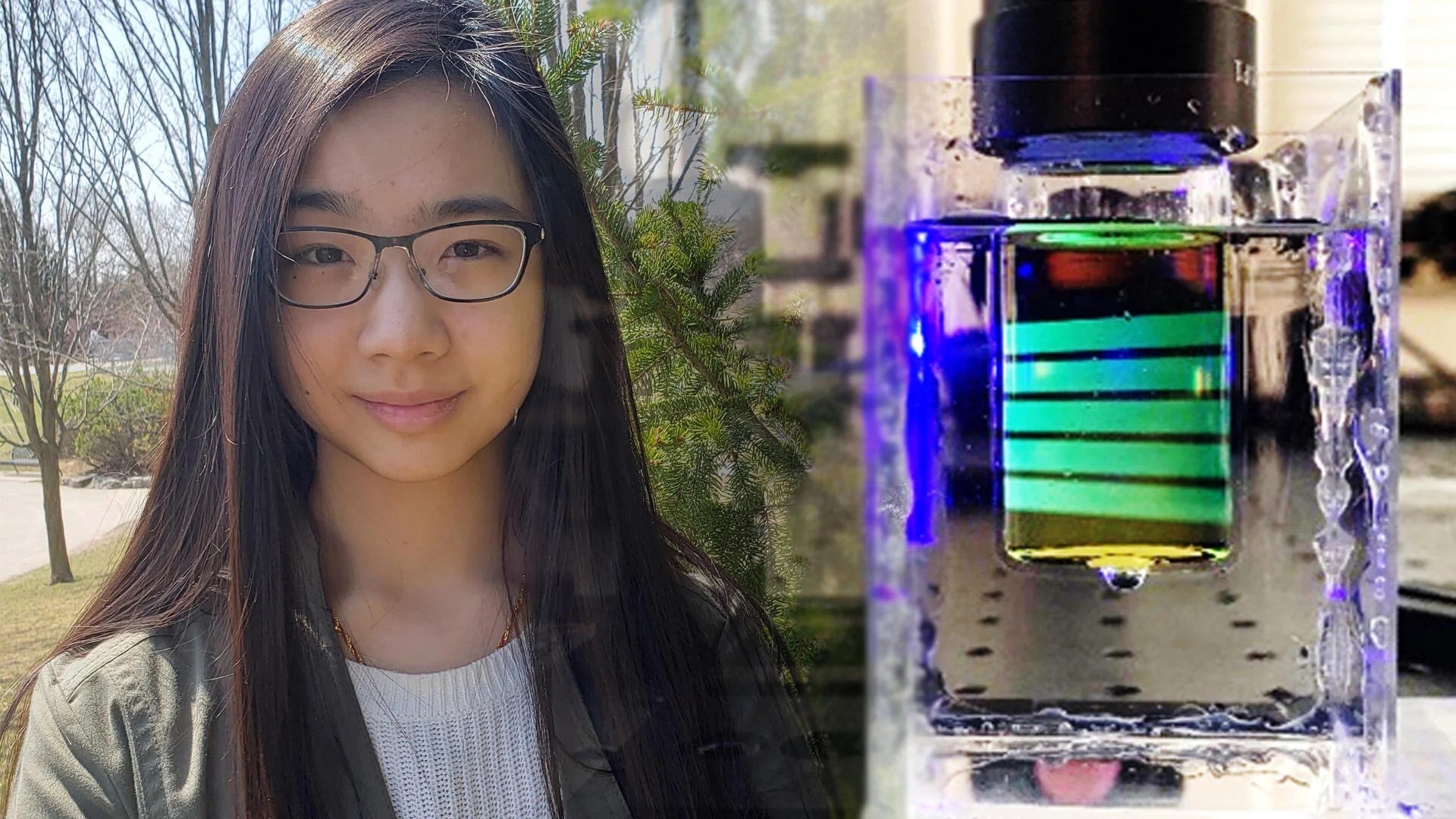
By Sonia Thomson. This is an excerpt of an article originally published on Waterloo News.
Tomographic 3D printing is a revolutionary technology that uses light to create three-dimensional objects. A projector beams light at a rotating vial containing photocurable resin, and within seconds the desired shape forms inside the vial. The light projections needed to solidify specific 3D regions of the polymer are calculated using tomographic imaging concepts.
The technology was first demonstrated by researchers at the University of California, Berkeley and Lawrence Livermore National Labs in 2019, and a Swiss group at École Polytechnique Fédérale de Lausanne (EPFL) in 2020. It is significantly faster than traditional 3D printing in layers, can print around existing objects, and does not require support structures.
Though incredible, the technology can get messy in the lab. The vial’s round shape makes it refract rays like a lens. To counter this, experts use a rectangular index-matching bath that provides a flat surface for rays to pass through correctly. The vial of resin must be dipped in and out of the bath for each use – creating a slimy situation.
New equations and code cut technology loose
It was slimy, that is, until a student from the University of Waterloo joined the National Research Council of Canada (NRC) for a virtual co-op term in 2020. Kayley Ting, who is doing a bachelor of applied science (BASc) degree in biomedical engineering, worked with machine vision and 3D printing experts from the NRC’s Digital Technologies and Security and Disruptive Technologies Research Centres.
Together they developed a technology that computationally corrects for optical distortions. New equations compensate for the vial’s round shape and eliminate the need for the goopy, square bath, while still enabling the nearly instant production of precise polymer shapes using light.
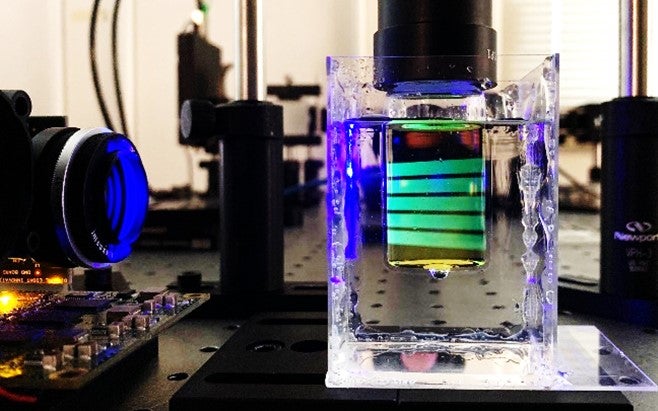
Now you see it, now you don’t: tomographic printing using the goopy index bath (above) and freed from bath (below). The green light in the vial is fluorescence – a by-product of the 3D printing process that conveniently highlights the path of light in the vial.
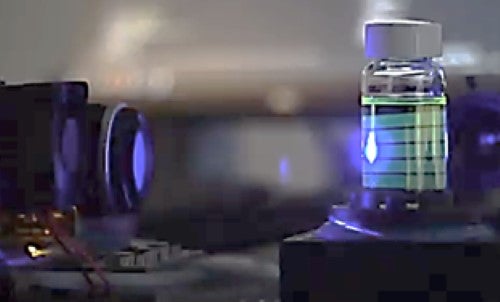
The team also developed new code to program the printer so that it could produce complex objects and be easily used by non-experts. They recently published their new method and findings in Optics Express, an open-access scientific journal, and revealed a few dazzling shapes they produced.
Virtual co-op term generates real progress
Due to COVID-19 pandemic restrictions, Kayley could not access the lab in Ottawa where objects are printed. But that didn’t stop her from innovating at a distance. To print complex objects using STL files, Kayley wrote the code that imports the 3D object file, slices it, and converts 2D slices to the light projections that will be shone on the vial. Intensive computations are required at this step.
“While it used to take about an hour to process a print file, Kayley’s version of the code usually takes less than a minute to execute,” says Antony Orth, research officer from Digital Technologies and Kayley’s supervisor.
The progress made by Kayley during her virtual work term at the NRC will have practical applications in the future.
“Kayley also produced a simple user interface with buttons and menus that enables people to use the printer without knowing how to code. This is a huge deal for us as it will make the technology much more usable at the NRC and for others interested in tomographic 3D printing,” says Chantal Paquet, research officer from Security and Disruptive Technologies.
Beyond the Bulletin Episode 87

The latest episode of the Beyond the Bulletin Podcast is now live. Cathy Newell Kelly, University Registrar, discusses 20 years of Quest, the student information system, how it started, and why discussions are underway to replace it. The School of Optometry and Vision Science cuts the price of eye exams. Registration is open for the Return to Work Town Hall. And the Hallman Lecture will feature the national chief of the Assembly of First Nations discussing COVID-19 in Indigenous communities.
Link of the day
When and Where to get support
Students can visit the Student Success Office online for supports including academic development, international student resources, leadership development, exchange and study abroad, and opportunities to get involved.
Instructors can visit the Keep Learning website to get support on adapting their teaching and learning plans for an online environment.
Course templates are available within your course in LEARN to help you build and edit your content and assignment pages quickly.
The following workshops, webinars, and events are offered by the KL team (CTE, CEL, ITMS, LIB):
- Independent Remote Course Design Essentials, self-directed, continuous self-enrollment course in LEARN.
- Remote Teaching Support Drop-In, weeks of April 26th and May 3rd
- Getting Ready to Facilitate Online Courses: TA Training, beginning Monday, May 3
- LEARN for TAs (CTE6550), Tuesday, May 18, 1:30 p.m. to 3:00 p.m.
Employees can access resources to help them work remotely, including managing University records and privacy of personal information. Here are some tips for staying healthy while working from home.
Stay informed about COVID cases on campus by consulting the COVID case tracker.
The Writing and Communication Centre has virtual services and programs to help undergrads, grad students, postdocs and faculty members with academic writing.
- Meet with writing advisors in one-to-one appointments to brainstorm, draft, revise, and polish. No time for an appointment? Try email tutoring for undergrads.
- Beat isolation and make writing progress at weekly Virtual Writing Cafés for grad students and faculty or PJ-Friendly Writing Groups for Undergrads.
- Take an online workshop or apply to our popular Dissertation Boot Camp program.
- Faculty can request custom in-class workshops for their courses, or the WCC can facilitate any existing workshops for student groups.
Co-op students can get help finding a job and find supports to successfully work remotely, develop new skills, access wellness and career information, and contact a co-op or career advisor.
The Centre for Career Action assists undergraduates, graduate students, postdocs, staff, faculty, and alumni through navigating career services that are right for them. You can attend a one-on-one appointment or same day drop-in session at the CCA for assistance with cover letter writing, career planning and much more. You can also book an appointment online or visit our Live Chat to connect with our Client Support Team. The CCA is here to help you.
If you feel overwhelmed or anxious and need to talk to somebody, please contact the University’s Campus Wellness services, either Health Services or Counselling Services. You can also contact the University's Centre for Mental Health Research and Treatment. Good2Talk is a post-secondary student helpline available to all students.
The Library has published a resource guide on how to avoid information overload.
The Faculty Association of the University of Waterloo (FAUW) continues to advocate for its members. Check out the FAUW blog for more information.
The University of Waterloo Staff Association (UWSA) continues to advocate for its members. Check out the UWSA blog for more information.
The Indigenous Initiatives Office is a central hub that provides guidance, support, and resources to all Indigenous and non-Indigenous campus community members and oversees the university Indigenization strategy.
The Waterloo Indigenous Student Centre, based at St. Paul’s University College, provides support and resources for Indigenous students, and educational outreach programs for the broader community, including lectures, and events.
WUSA supports for students:
Peer support - MATES, Glow Centre, RAISE, Women’s Centre - Visit https://wusa.ca/peersupport to book an appointment
Bike Centre – Will be reopening soon.
Campus Response Team, ICSN, Off Campus Community and Co-op Connection all available online. Check https://wusa.ca for more details.
Food Support Service food hampers are currently available from the Turnkey Desk on weekdays from 7:30 a.m. to 7:00 p.m. in the Student Life Centre. If you have any questions please email us at foodsupport@wusa.ca.
Centre for Academic Policy Support - CAPS is here to assist Waterloo undergraduates throughout their experience in navigating academic policy in the instances of filing petitions, grievances and appeals. Please contact them at caps@wusa.ca. More information is available.
WUSA Commissioners who can help in a variety of areas that students may be experiencing during this time:
- Equity – equity@wusa.ca
- Co-op and Experiential Affairs – coop.affairs@wusa.ca
WUSA Student Legal Protection Program- Seeking legal counsel can be intimidating, especially if it’s your first time facing a legal issue. The legal assistance helpline provides quick access to legal advice in any area of law, including criminal. Just call 1-833-202-4571.
Empower Me is a confidential mental health and wellness service that connects students with qualified counsellors 24/7. They can be reached at 1-833-628-5589.
When and Where (but mostly when)
Healthy Warriors at Home (Online Fitness)
Drop-in to Warrior Virtual Study Halls on Wednesdays from 5:30 p.m. to 7:00 p.m. Come together in this virtual space to set goals and work independently or in groups each week.
Renison English Language Institute continues to offer virtual events and workshops to help students practice their English language skills.
Warriors vs. Laurier Blood Donation Battle. Join your fellow Warriors, donate blood and help us win the Blood Battle against Laurier for a second year in a row. Set up a profile or add the PFL code: UNIV960995 to your account if you have a blood.ca account already. Questions? Contact WarriorsInfo@uwaterloo.ca.
Virtual Writing Café, Tuesday, May 11, 9:00 a.m.
Return to Campus Virtual Town Hall, Tuesday, May 11, 1:30 p.m.
Breaking Free From Low Mood, Tuesday, May 11, 2:30 p.m.
PJ-Friendly Writing Groups, Wednesday, May 12, 10:00 a.m.
36th Annual Meeting of the Canadian Biomaterials Society, Thursday, May 13 to Saturday, May 15. Hosted by the University of Waterloo.
Indigenous-Mennonite Encounters: Conference Preview, Thursday, May 13, 10:00 a.m.
Engineering Term Olympics, Friday, May 14 and Saturday, May 15.
Lectures in Catholic Experience presents The Black Church in Canada featuring Carol Duncan, PhD, professor, Department of Religion and Culture, Wilfrid Laurier University, Friday, May 14, 7:30 p.m., online.
Centering Indigenous engagement in the work of wellbeing and health promotion, Monday, May 17, 1:00 p.m.
Ballet After Dark: Strength & Healing Through the Arts, Tuesday, May 18, 1:00 p.m. to 2:30 p.m.
NEW - GEDIx: A 30-minute Exchange, Tuesday, May 18, 1:00 p.m.
Health Challenges Forum, Tuesday, May 18, 2:00 p.m.
Warriors Athletics and Recreation Spring Virtual Open House. Tuesday, May 18, 4:00 p.m. Learn about how to stay active and engaged this spring term. Register now.
How faculty members can counter anti-Black racism in universities, Wednesday, May 19, 12:00 noon to 1:00 p.m.
Resilient Warriors Virtual Panel presented by President’s Golf.Wednesday, May 26, 4:00 p.m. Panel featuring Mandy Bujold (Olympic Boxer), Dr. Kim Dawson (Mental Performance Consultant), Tre Ford (Student-Athlete) and Garrett Rank (NHL Referee, Canadian Amateur Golfer). Free tickets for students, staff, faculty and Alumni. Register now.